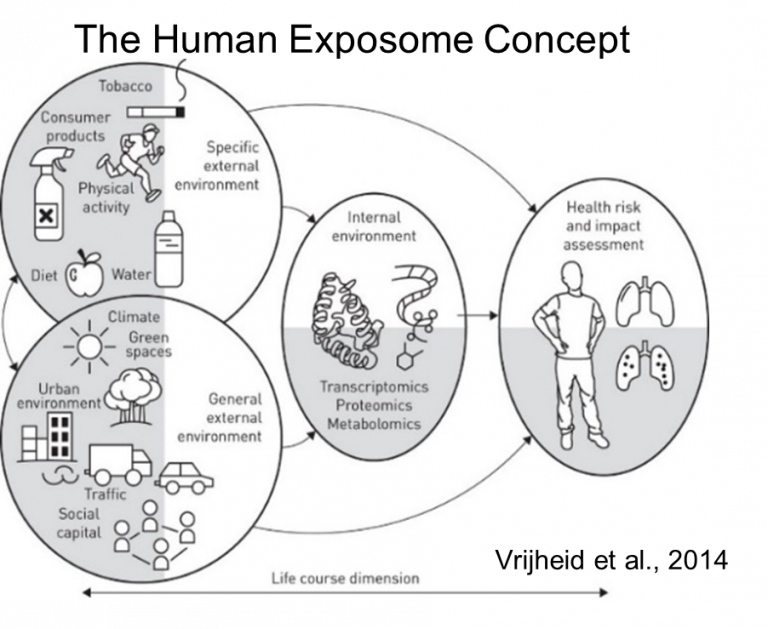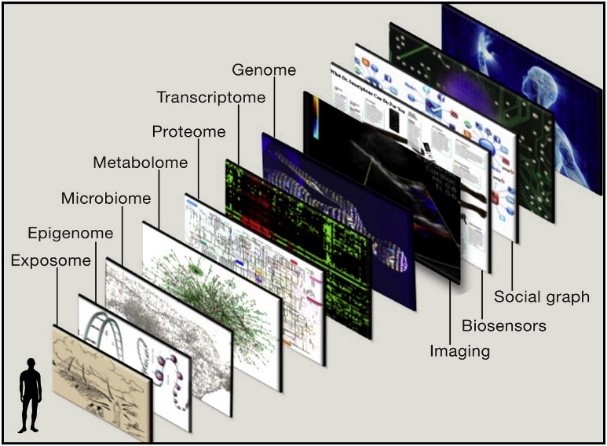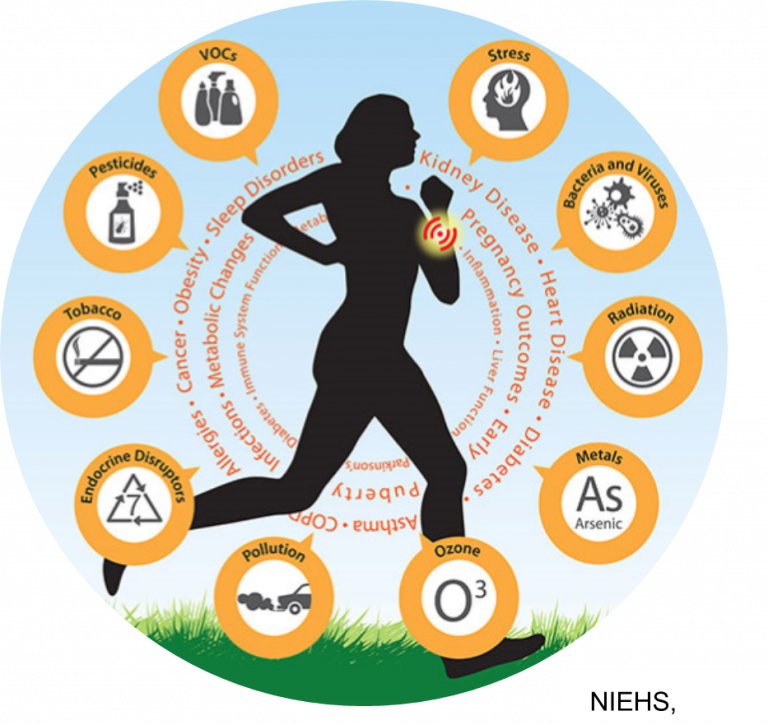Health is a very important value. The scientific discipline of the human exposome aims to map and measure our environment to study its impact on health, aiming to predict future diseases and prevent their onset. The work of historian-philosopher Michel Foucault shows that science is not solely an objective and rational practice, but highly normative and both shaped by and shaping society and its inhabitants. How can the work of Foucault inform the new scientific discipline of the human exposome?
The human… what?
In part, our genetic make-up determines health during our lifetimes. For a larger part, health is influenced by our environments: where we live, how we live, with whom we live, etc. The human exposome is defined as “every exposure to which an individual is subjected from conception to death.” This includes both physical and social factors external to our body, as well as its biological impacts, that accumulate over the life course. Exposome research aims to study all these factors combined and determine their impact on health, trying to better understand, predict, and prevent all kinds of diseases and health issues by contributing to public health interventions and practices.

Many technologies are used and developed to enable the mapping of the exposome. For example, all kinds of sensors to monitor environmental exposures; ‘omics’ technologies to measure all kinds of biological molecules such as proteins (proteomics) and chemical metabolites (metabolomics); and machine learning and big data techniques to manage and analyze large amounts of exposure data.

The multiple layers of data that can be measured for the human exposome. Topol, 2014
Rational science?
Scientific research is usually considered to be an objective and rational means to gather knowledge – in the exposome’s case to quantify environmental exposures and biological processes, and their health impact. However, research does not take place in a scientific vacuum. The famous historian and philosopher Michel Foucault has described how science, the knowledge it produces, and the institutions that apply this knowledge are both culturally and societally produced as well as structure and shape certain kinds of societies and citizens. For Foucault, this shaping, producing, and structuring are forms of power that are omnipresent in society: power relations shape how society and its inhabitants think and behave. Foucault calls this disciplinary power. However, unlike many other theories of power in society, disciplinary power does not need to be centralized in one agent, party, or institution for it to shape and structure: power manifests within the societal system itself, between, and even within, individuals.
The power of a prison
Foucault illustrates how structures of power and discipline work with a case study of philosopher Jeremy Bentham’s Panopticon. The essential feature of this round prison is that the guard in the tower can see all convicts in their cells, but the convicts cannot see the guard in the tower, nor their fellow convicts. The convicts will behave properly as they cannot know when they are being surveilled and thus need to assume being surveilled all the time, without the guards needing to constantly threaten the prisoners with punishment measures. This way, the structure of the building guarantees order: it automates power. The Panopticon is an architectural system in which no real physical control or power needs to be exercised for the successful imprisonment of convicts. The principle of the Panopticon can be applied to any system or institution of disciplinary power: a factory, hospital, or school. The inmates can be criminal convicts and the supervisors the prison guards, but also workers and supervisors; patients and doctors; schoolchildren and teachers. Power is omnipresent.

Image by Foucault.info
Discipline: measure, supervise, correct
Human exposome research and public health institutions are part of these societal power structures of discipline and surveillance. Their knowledge production and population interventions shape dualities such as healthy or diseased humans bodies, harmful or harmless environments, and normal or abnormal people. Foucault calls this binary division and branding: exposome research uses techniques of measuring to divide the normal and abnormal, public health institutions use supervision to brand the individuals (or environments) that are normal or abnormal, and correction to discipline (cure, improve, reform) the abnormal. The binary categories are not value-neutral: health is better than disease, being healthy is better than diseased.
Foucault’s trick
The trick in Foucault’s disciplinary society is that the sciences and institutions do not need to violently force health behaviors onto the public: they do not need to show physical power to make people think and act like they want to be healthy. Individuals internalize the norms shaped by the sciences and monitor themselves for complying to these norms: who does not want to be healthy, to be sane, to be normal, right? Thus, the science of exposome and its public health institutes are not the only disciplinary powers within this system: internalized norms make individuals discipline themselves to comply with health norms, as we do not want to deviate from norms and be ‘abnormal’.
The human exposome will provide public health institutes with many more ways of measuring, supervising, and correcting, such as large-scale mapping and modeling of environmental exposures and health impacts; new leads for health screening and monitoring programs to detect early diseases; new preventive interventions and treatments. Individuals will be offered new and more ways of measuring, supervising, and correcting themselves as well, e.g. in the forms of wearable sensors and smartphone apps, lifestyle recommendations, and how to organize the personal living environment.

Image by National Institute of Environmental Health Science (2014)
Power to the people?
However, when individuals are disciplining and shaping themselves and expected to take responsibility for their own health, to what extent can individuals be held responsible for the complex and life-long influence of all the exposures and biological processes that form the exposome? We cannot choose and shape all of our environment. Where we are born and grow up has a large impact on our health and chances in life, as well as the environments we are likely to spend our future lives. Power structures in society are inevitable, according to Foucault. However, his work helps to recognize these powers and the relations between societal actors such as sciences, institutions, and ourselves. This is an important first step for reflection and examination of who are the normal and abnormal – the winners and losers – within these structures. Even though distributions of power in society are inevitable, Foucault believed that we should find a productive relation towards shaping and producing powers, take a stance towards them, and ask what kind of society we want to live in.
References
Foucault, M. (1975). Discipline and Punish: The Birth of the Prison, New York: Random House
Foucault, M. (1984). The Use of Pleasure, vol. 2 of The History of Sexuality. London: Penguin
Foucault, M. (1984). The Care of the Self, vol. 3 of The History of Sexuality. London: Penguin
Wild, C. P. (2005). Complementing the genome with an “exposome”: the outstanding challenge of environmental exposure measurement in molecular epidemiology. Cancer Epidemiology and Prevention Biomarkers, 14(8), 1847-1850.
Picture credits
Topol, E. J. (2014). Individualized medicine from prewomb to tomb. Cell, 157(1), 241-253.
Vrijheid, M. (2014). The exposome: a new paradigm to study the impact of environment on health. Thorax, 69(9), 876-878.



